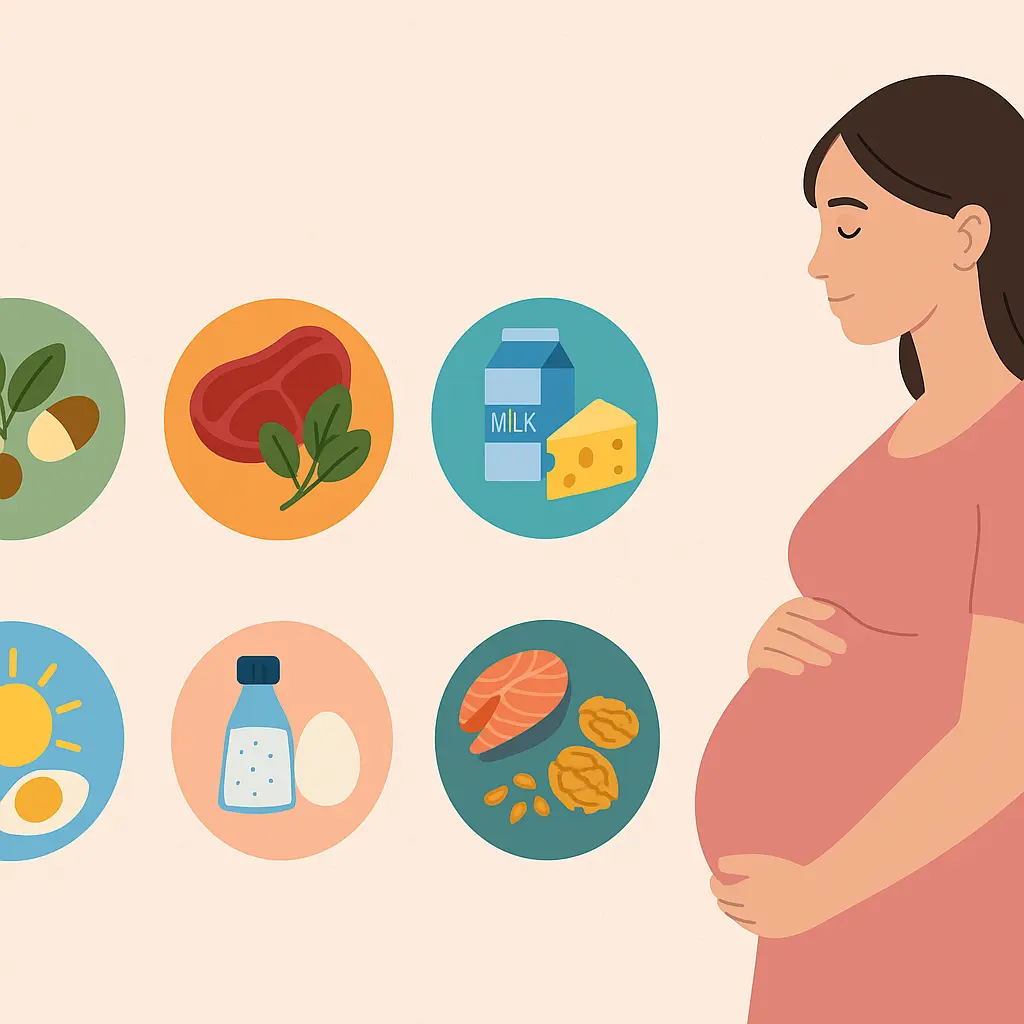Which Vitamins and Minerals During Pregnancy are Important for Woman?
Pregnancy is a transformative journey for both the mother and the baby. To support this growth, a woman’s body needs a higher intake of certain vitamins and minerals. These nutrients not only contribute to the baby’s brain, bone, and organ development but also help the mother maintain her strength and energy levels throughout the pregnancy.
Below are key vitamins and minerals during pregnancy & every woman should focus on, along with their benefits and sources.
1. Folic Acid Benefits (Vitamin B9)
Folic acid is one of the most crucial vitamins in early pregnancy. It helps in the development of the baby’s neural tube, which later forms the brain and spinal cord. Deficiency of folic acid during the first few weeks can lead to serious birth defects like spina bifida. Doctors recommend starting folic acid even before conception and continuing through the pregnancy.
Best Sources: Green leafy vegetables, oranges, lentils, beans, and fortified cereals.
Recommended Intake: 400–600 micrograms per day.
2. Iron for Pregnancy
During pregnancy, the body produces extra blood to support the baby’s development. Iron helps in making hemoglobin, the oxygen-carrying component of blood. A deficiency can lead to anemia, causing fatigue, weakness, and complications during delivery. Iron also supports the baby’s growth and brain development.
Best Sources: Red meat, chicken, spinach, lentils, beans, and iron-fortified foods.
Recommended Intake: 27 mg per day.
3. Calcium for Bones
Calcium is vital for building your baby’s bones and teeth. If you don’t get enough calcium from your diet, your body will draw it from your bones, which can weaken your own bone density. It also plays a role in heart, muscle, and nerve development.
Best Sources: Milk, yogurt, cheese, broccoli, almonds, and fortified plant-based milk.
Recommended Intake: 1,000 mg per day.
4. Vitamin D Support
Vitamin D works hand-in-hand with calcium to help the baby develop strong bones and teeth. It also supports the immune system of both the mother and baby. Deficiency in vitamin D during pregnancy has been linked to complications like preeclampsia and gestational diabetes.
Best Sources: Sunlight, fortified dairy products, egg yolks, salmon, and supplements.
Recommended Intake: 600 IU per day.
5. Iodine for Development
Iodine is essential for healthy brain and nervous system development in babies. It also supports thyroid function, which helps regulate metabolism. A lack of iodine during pregnancy can lead to developmental delays and intellectual disabilities in the baby.
Best Sources: Iodized salt, dairy, seafood, and eggs.
Recommended Intake: 220 mcg per day.
6. Vitamin B12 Essentials
Vitamin B12 helps in red blood cell formation and supports the nervous system. It’s especially important for vegetarians, as this vitamin is primarily found in animal-based foods. Low levels can result in fatigue, nerve issues, and potential complications in baby’s brain development.
Best Sources: Meat, dairy, fish, eggs, and fortified cereals.
Recommended Intake: 2.6 mcg per day.
7. Omega-3 Fatty Acids
Omega-3 fatty acids, especially DHA, are vital for the baby’s brain and eye development. They also reduce the risk of preterm birth and may improve the mother’s mood and brain function during and after pregnancy.
Best Sources: Fatty fish like salmon and sardines, walnuts, flaxseeds, and omega-3 supplements (pregnancy-safe).
Recommended Intake: At least 200–300 mg DHA per day.
Conclusion: Moving Toward a Brighter Future
Pregnancy is a beautiful phase, and with the right nutrition, you can make it healthier for you and your baby. Always consult your gynecologist before starting or adjusting vitamins and minerals for pregnancy. A balanced diet, rich in vitamins and minerals, is the foundation of a healthy pregnancy.

Need help or have questions about your pregnancy? Contact us Now! or view our gynaecology’s guide today for a personalized assessment and begin the journey toward healing through movement.
FAQs About Pregnancy, Vitamins & Minerals
The most essential nutrients during pregnancy include folic acid, iron, calcium, vitamin D, iodine, vitamin B12, and omega-3 fatty acids (especially DHA). These support the baby’s development and the mother’s health.
Yes. Even if you eat well, it’s hard to get enough of all the essential nutrients through food alone. Prenatal vitamins are designed to meet the extra needs of pregnancy.
Yes. Excessive intake, especially of Vitamin A or iron, can be harmful. Always follow your doctor’s recommendations.
Yes. Most prenatal multivitamins already contain the required amount of folic acid. However, always consult your doctor before combining supplements.
Doctors recommend starting prenatal vitamins at least one month before conception and continuing throughout pregnancy to ensure proper neural development in the early weeks.
Prenatal vitamins can help fill the nutritional gap. Eating small, frequent meals and choosing bland, dry foods may also help.
